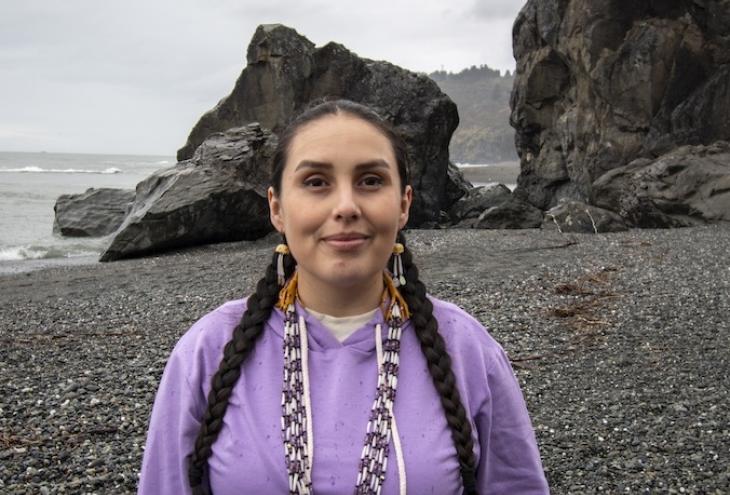Traditionally, members of the Karuk Tribe consumed about 450 pounds of salmon per person, per year. Brook Thompson may not have the privilege to eat that much because of environmental neglect and dams built on the Klamath River, but salmon is significant to her culturally, having grown up as a fisherwoman. The importance of salmon and fresh water to her people has always resonated with her. As a result, Thompson is intent on ensuring that both the salmon and fresh water sources are always protected. Now she is well on her way to accomplishing that, having completed her first year as a PhD student in environmental studies with an emphasis on coastal science and public policy at the University of California, Santa Cruz.
Growing up, Thompson split her time between the Yurok Reservation in Klamath, Calif., with her dad’s side of the family, and Portland, Ore., with her mom’s side of the family. While some may have found the differences between the two homes jarring, Thompson embraced them. “I got to experience both ends of the spectrum,” explains Thompson. “The first was a place where everyone looked like me and I was surrounded by culture and fishing, the other a place where no one looked like me, but I was surrounded by more after-school programs and events.”
The opportunity to learn from both sides of her family has been invaluable to Thompson. Her Yurok grandfather instilled a love for her culture and language that Thompson still cherishes today. From her mother’s parents, both of whom have advanced degrees, Thompson came to understand the importance of a formal education and received the support to pursue her own academic dreams. “I’m not sure if I would have had the same dedication to school if it wasn’t for having close people in my own life who are so well-educated,” says Thompson.
Following in her grandparents’ academic footsteps proved more challenging than Thompson anticipated. With no one familiar enough with the college application process to help her, Thompson muddled through on her own. “There seem to be so many unwritten rules and tactics for getting into college,” says Thompson, who gives the example of filing the all-important FAFSA form, which is free at studentaid.gov. “I didn’t know what FAFSA stood for. I googled where to fill out the FAFSA and clicked on a website that seemed legitimate,” explains Thompson. “At the end it asked me to pay $80. I did, and it was gone. Eighty dollars was a big deal to me.”
Thompson learned her lesson and has been fortunate to have all her schooling paid for through scholarships. But even with such financial support, she has struggled in other areas. “The university system, despite its major leaps and bounds since my grandparents’ time, was not made for a Native American, biracial, Queer, learning disabled woman,” notes Thompson. While pursuing her BS and MS in civil engineering at Portland State University, she was often the only Native student in her classes.
To find individuals she could connect with, Thompson took classes outside engineering, in areas like entrepreneurship, law, Indigenous studies, and art. In those classes she not only learned skills that have helped her in her engineering career, but also found a sense of community where she is not the only Native. “One of my biggest recommendations is to take at least one class outside your field of study,” Thompson says. “You will meet people you would never usually be around, and it might help expand your worldview.”
Thompson also found support through AISES. When she learned that Portland State University no longer had an active AISES chapter, she helped rebuild the group with the help of another student, Chris Rempel, and support from Tim Anderson, department chair of the engineering and technology management department. The rejuvenated chapter created another space for her to connect with like-minded students who understand the struggles of being Indigenous and in STEM. “They have been there to support me through all my trials and tribulations as a college student,” says Thompson. “I would not be who I am today without AISES.”
Now, after nine years and six different universities, Thompson has completed the first year of her PhD program and is excited to continue working as a civil/restoration engineer in engineering management. Eventually, Thompson would like to join the California Water Resources Board and the Yurok Tribal Council. “I can think of no greater honor than serving my community and using these resources I’m learning about to benefit the future of my tribe,” explains Thompson.
Although it has not been easy, Thompson has learned to appreciate all she has accomplished so far. Through learning how to forgive herself, be persistent, and have empathy for others, Thompson is succeeding in academia and beyond. She hopes to inspire others to follow their dreams, regardless of how long it may take or how lonely it may feel. “Sometimes the biggest challenge for your own dreams is your own fear of failure and perception of yourself,” says Thompson. “Learn from those failures.”













